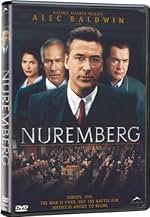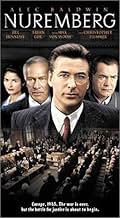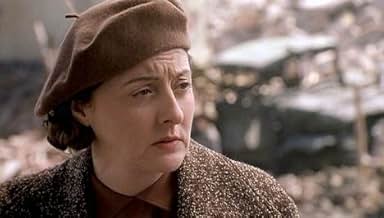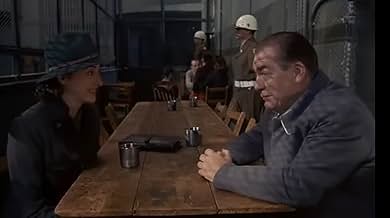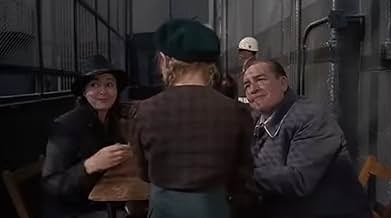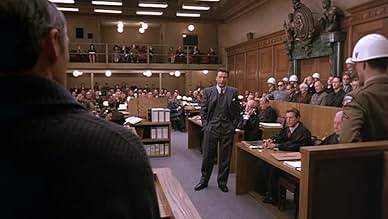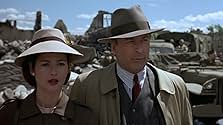Relato dramatizado de los juicios por crímenes de guerra tras la derrota de la Alemania nazi en la Segunda Guerra Mundial.Relato dramatizado de los juicios por crímenes de guerra tras la derrota de la Alemania nazi en la Segunda Guerra Mundial.Relato dramatizado de los juicios por crímenes de guerra tras la derrota de la Alemania nazi en la Segunda Guerra Mundial.
- Ganó 2 premios Primetime Emmy
- 10 premios ganados y 33 nominaciones en total
Explorar episodios
Opiniones destacadas
Quite a few reviewers seem to be taken by the historicity of this movie. It's true that many of the details are correct - but it is also true that many others are wildly incorrect. The most egregious one is the romantic liaison between Justice Jackson and his assistant. I guess that the producers introduced the romantic element for the sake of a wider appeal, but the fact is that, in light of the actual events, this looks ridiculous. Which is a shame, for the movie would have been far more valuable without that silliness. It's mostly because of this that I don't think that it deserves more than 5 points. The bright sides are Brian Cox's and Michael Ironside's performances, and also, but to a lesser extent, Christopher Plummer's and Matt Craven's. Alec Baldwin delivers the same kind of underwhelming performance that he usually does, and Jill Hennessy does whatever she can with her inane and fictitious part.
In summary, it could have been a good movie, but it is just a decent one.
In summary, it could have been a good movie, but it is just a decent one.
`Nuremburg' is a chilling and disturbing look at the Nuremberg trial of Nazi war criminals after WWII. The story is historically accurate and captures the political and psychological climate of the times. It also serves as a distressing reminder to a young generation that has not experienced war in its lifetime of the horrors of which humanity is capable.
The film examines a number of fascinating angles of the trial. Instead of just focusing on the trial itself (of which there is plenty), it also offers a look at the political rivalry and infighting of the victorious nations, and a number of character studies of the prisoners. The most prominently portrayed of these is Hermann Göring (Brain Cox), Reich Marshall of the Third Reich and a member of Hitler's inner circle. Göring is portrayed as a cunning and charismatic adversary, who almost succeeds at making a sham of the entire trial.
The haunting question that must pervade anyone's mind that ponders the atrocities that occurred in WWII Germany is verbalised in the film by Elsie Douglas (Jill Hennessey). She says, `How could civilised human beings ever do that to other civilised human beings?', to which Justice Jackson (Alec Baldwin) replies, "Maybe civilization is overrated." This film provides some insight into the motivation of the German leaders, examining the warped perspective of the perpetrators who attempt to rationalise the horrors they committed to themselves and to the court. They point to the German sense of duty and obedience that is ingrained into their culture. After all, they were only following orders. There is also the undercurrent of Hitler's ruthlessness in using the SS to eliminate all opposition. In a particularly lucid moment, Göring says that if you look up and down the cellblock all you see is `yes men' because all the `no men' are six feet underground. Göring also points out the hypocrisy of the criticism of German hatred of the Jews by a U.S. society that interred millions of Japanese citizens, and tolerates segregation and hate-crimes against blacks.
Certainly, this is no justification for the systematic annihilation of 10 million of their own citizens, and as the film progresses a number of the prisoners begin to express deep remorse for their actions. Still, it shows that these weren't a group of sociopathic monsters in the conventional sense. They were otherwise normal men who had accomplished the inconceivable by dehumanising their victims to the point where the horrors they committed every day were no more disturbing to them than hunting deer to trim the herd. This is the most frightening thought of all, because it portends the possibility that such unthinkable acts could happen again. As long as we are able to believe that these men were a gaggle of homicidal maniacs, a freak societal aberration, we can reassure ourselves that this couldn't ever recur. However, when it dawns on us that normal people are able to rationalize such behaviour, we realise that under the right circumstances the potential for such inhumanity always exists. Complacency is an inadvertent ally of oppression, and this film should shock even the most casual viewer out of it. In this regard, it is instructive and enlightening.
The direction by Yves Simoneau is excellent and rises well above his mostly TV credits. The mood of the period is realistically rendered with a great deal of period accuracy. The costumes and period props are excellent with an eye for detail. He does an outstanding job creating background reaction shots, especially among the prisoners, that show their sarcastic disdain for their captors and display their smug superiority. He brings great power to numerous scenes using various camera angles. The holocaust footage used is some of the most disconcerting and inclusive I have ever seen. If there is any criticism to be leveled against the crafting of this film, it is that it delved too deeply into minutia, especially the sexual undercurrents between Jackson and Elsie Douglas. However, given the fact that it was produced as a TNT miniseries, the director was forced to fluff it up for the additional runtime.
The acting is also outstanding. Alec Baldwin gives a solid performance as Robert Jackson, a man obsessed with justice. Baldwin has never been known for his passion, but he elevates his game in certain parts of this film. Jill Hennessey is also excellent as Elsie, rendering her as a tough and smart woman who is a guiding force in the entire proceeding. However, by far the best performance is delivered by Brain Cox as Göring. His is a brilliant and complex performance that brings the reprehensible and magnetic Nazi leader to life in a way that is both attractive and loathsome. Colm Feore also gives a spine tingling performance as Rudolf Höss, the Commandant of Auschwitz concentration camp, who cavalierly discusses the efficiency techniques of eliminating prisoners, with the cold precision of an industrial engineer.
This terrific drama rises far above its TV roots. I rated it a 9/10. It is important viewing which reminds us that we cannot become complacent about tyranny, and we must be ever vigilant to guard against its recurrence.
The film examines a number of fascinating angles of the trial. Instead of just focusing on the trial itself (of which there is plenty), it also offers a look at the political rivalry and infighting of the victorious nations, and a number of character studies of the prisoners. The most prominently portrayed of these is Hermann Göring (Brain Cox), Reich Marshall of the Third Reich and a member of Hitler's inner circle. Göring is portrayed as a cunning and charismatic adversary, who almost succeeds at making a sham of the entire trial.
The haunting question that must pervade anyone's mind that ponders the atrocities that occurred in WWII Germany is verbalised in the film by Elsie Douglas (Jill Hennessey). She says, `How could civilised human beings ever do that to other civilised human beings?', to which Justice Jackson (Alec Baldwin) replies, "Maybe civilization is overrated." This film provides some insight into the motivation of the German leaders, examining the warped perspective of the perpetrators who attempt to rationalise the horrors they committed to themselves and to the court. They point to the German sense of duty and obedience that is ingrained into their culture. After all, they were only following orders. There is also the undercurrent of Hitler's ruthlessness in using the SS to eliminate all opposition. In a particularly lucid moment, Göring says that if you look up and down the cellblock all you see is `yes men' because all the `no men' are six feet underground. Göring also points out the hypocrisy of the criticism of German hatred of the Jews by a U.S. society that interred millions of Japanese citizens, and tolerates segregation and hate-crimes against blacks.
Certainly, this is no justification for the systematic annihilation of 10 million of their own citizens, and as the film progresses a number of the prisoners begin to express deep remorse for their actions. Still, it shows that these weren't a group of sociopathic monsters in the conventional sense. They were otherwise normal men who had accomplished the inconceivable by dehumanising their victims to the point where the horrors they committed every day were no more disturbing to them than hunting deer to trim the herd. This is the most frightening thought of all, because it portends the possibility that such unthinkable acts could happen again. As long as we are able to believe that these men were a gaggle of homicidal maniacs, a freak societal aberration, we can reassure ourselves that this couldn't ever recur. However, when it dawns on us that normal people are able to rationalize such behaviour, we realise that under the right circumstances the potential for such inhumanity always exists. Complacency is an inadvertent ally of oppression, and this film should shock even the most casual viewer out of it. In this regard, it is instructive and enlightening.
The direction by Yves Simoneau is excellent and rises well above his mostly TV credits. The mood of the period is realistically rendered with a great deal of period accuracy. The costumes and period props are excellent with an eye for detail. He does an outstanding job creating background reaction shots, especially among the prisoners, that show their sarcastic disdain for their captors and display their smug superiority. He brings great power to numerous scenes using various camera angles. The holocaust footage used is some of the most disconcerting and inclusive I have ever seen. If there is any criticism to be leveled against the crafting of this film, it is that it delved too deeply into minutia, especially the sexual undercurrents between Jackson and Elsie Douglas. However, given the fact that it was produced as a TNT miniseries, the director was forced to fluff it up for the additional runtime.
The acting is also outstanding. Alec Baldwin gives a solid performance as Robert Jackson, a man obsessed with justice. Baldwin has never been known for his passion, but he elevates his game in certain parts of this film. Jill Hennessey is also excellent as Elsie, rendering her as a tough and smart woman who is a guiding force in the entire proceeding. However, by far the best performance is delivered by Brain Cox as Göring. His is a brilliant and complex performance that brings the reprehensible and magnetic Nazi leader to life in a way that is both attractive and loathsome. Colm Feore also gives a spine tingling performance as Rudolf Höss, the Commandant of Auschwitz concentration camp, who cavalierly discusses the efficiency techniques of eliminating prisoners, with the cold precision of an industrial engineer.
This terrific drama rises far above its TV roots. I rated it a 9/10. It is important viewing which reminds us that we cannot become complacent about tyranny, and we must be ever vigilant to guard against its recurrence.
Hidden inside this purported battle between surviving top Nazi Hermann Goering and American prosecutor Judge Robert Jackson is, I think, the adaptation the writer probably wanted to do - the story of psychologist G. M. Gilbert and his backstage verbal tusslings with men who either refused to acknowledge any guilt (Goering, Streicher) or conversely were overflowing with it (Frank, Speer).
When you see Alec Baldwin appear a second time in the credits, as Executive Producer, you feel that Nuremberg was probably conceived as a vanity project for him. Fortunately it is quite easy to let the early scenes of the Court's setup just wash over you, and of course Jill Hennessey is always easy on the eyes. Much of the first half of the first episode is more or less soap opera. Jackson has to persuade Judge Biddle to go to Nuremberg, then to relinquish the Presidency of the court to the British. The bantering relationship with his secretary (Hennessey) serves as a prelude to their becoming lovers during their time in Germany.
At this point Hermann Goering appears (the great Brian Cox on top form), totally dominating the trial, totally dominating this mini-series, and your attention is grasped and held. Cox almost wipes Baldwin off the screen. Unfortunately it's very hard not to gain a great deal of sympathy for Goering, particularly when he is with his family, or in the heart-to-heart chats with his G. I. prison guard, Tex. We see Goering as he undoubtedly saw himself, but in reality he wasn't like that at all. The Nuremberg trial and the general travails of imprisonment were an excellent opportunity for him to smarten himself up: prior to his arrest he had become a dissolute and overweight drug addict. Unfortunately no sign of this weakness of character was carried over into the script, leaving an impression of Goering as a noble, principled man - irrespective of whether you agreed with his principles.
Also very watchable was Matt Craven in the role of Gilbert the aforementioned psychologist, and Christopher Plummer as British prosecutor David Maxwell-Fyfe (although the real Maxwell-Fyfe was the younger prosecutor, not an elder mentor as depicted here). Particularly gratifying is the scene in which Maxwell-Fyfe tells Jackson that "your documentary approach is legally impeccable - but as drama it's absolutely stultifying" - which might stand as an apt description of Baldwin's part in this series.
A last little curiosity, and not to make any personal remarks about Herbert Knaup, but I did find it strange that they cast Knaup, a slightly odd-looking actor, to play Albert Speer, by fairly common consent the handsomest and most photogenic of all the Nazi leaders, particularly as Speer was portrayed here in a sympathetic light. Other than Knaup, many of the actors were very close in looks to their real-life counterparts, most notably Roc LaFortune as Rudolf Hess, almost a living double.
When you see Alec Baldwin appear a second time in the credits, as Executive Producer, you feel that Nuremberg was probably conceived as a vanity project for him. Fortunately it is quite easy to let the early scenes of the Court's setup just wash over you, and of course Jill Hennessey is always easy on the eyes. Much of the first half of the first episode is more or less soap opera. Jackson has to persuade Judge Biddle to go to Nuremberg, then to relinquish the Presidency of the court to the British. The bantering relationship with his secretary (Hennessey) serves as a prelude to their becoming lovers during their time in Germany.
At this point Hermann Goering appears (the great Brian Cox on top form), totally dominating the trial, totally dominating this mini-series, and your attention is grasped and held. Cox almost wipes Baldwin off the screen. Unfortunately it's very hard not to gain a great deal of sympathy for Goering, particularly when he is with his family, or in the heart-to-heart chats with his G. I. prison guard, Tex. We see Goering as he undoubtedly saw himself, but in reality he wasn't like that at all. The Nuremberg trial and the general travails of imprisonment were an excellent opportunity for him to smarten himself up: prior to his arrest he had become a dissolute and overweight drug addict. Unfortunately no sign of this weakness of character was carried over into the script, leaving an impression of Goering as a noble, principled man - irrespective of whether you agreed with his principles.
Also very watchable was Matt Craven in the role of Gilbert the aforementioned psychologist, and Christopher Plummer as British prosecutor David Maxwell-Fyfe (although the real Maxwell-Fyfe was the younger prosecutor, not an elder mentor as depicted here). Particularly gratifying is the scene in which Maxwell-Fyfe tells Jackson that "your documentary approach is legally impeccable - but as drama it's absolutely stultifying" - which might stand as an apt description of Baldwin's part in this series.
A last little curiosity, and not to make any personal remarks about Herbert Knaup, but I did find it strange that they cast Knaup, a slightly odd-looking actor, to play Albert Speer, by fairly common consent the handsomest and most photogenic of all the Nazi leaders, particularly as Speer was portrayed here in a sympathetic light. Other than Knaup, many of the actors were very close in looks to their real-life counterparts, most notably Roc LaFortune as Rudolf Hess, almost a living double.
Well done, as television movies go. There seems to have been a substantial budget and an awful lot of research behind it. There are times when points and characters are overstated, but it's an improvement over "Judgment at Nuremberg." This film puts the Nazi leaders on trial and finds most of them guilty of crimes against humanity, while others are sentenced to prison. "Judgment at Nuremberg" put the entire nation of Germany on trial, handed the thankless task of defending Germany's role in World War II to Maximilion Schell, and found every German who ever breathed to be guilty of every sin that's ever been committed in the history of humankind. The scriptwriter, Abby Mann, accepted his Academy Award "in the name of all intellectuals everywhere." This modest production fills in many of the blanks that are missing from the public's understanding of the Nuremberg trials. Where, for instance, did the prisoners and staff of the trials find housing in Nuremberg, an ancient city that had been flattened by Allied bombing and in which there were still hundreds of decomposing bodies beneath the rubble? And did all the four major powers -- the US, Britain, France and Russia agree on the format and the procedures? Answer: No, the Russians and the French, who had suffered most under Nazissm, wanted summary executions of all the bigwigs. The subject is dead serious but the program has its quietly amusing moments -- the brash, ugly Russian representative trying to persuade the horrified French representative that he should lace his fine wine with a good belt of vodka. It has the limitations of most commercial productions. The Russian guy really IS ugly, and almost all the Germans are played by men with names like O'Keefe. There are many choker closeups, a technique that befits the small screen.
The Nazi leaders of course are villains of the worst sort but they're shown as humans too. After the surrender, an ebullient Goering, Brian Cox, unexpectedly drives up to an American Air Force base with his wife and child, dismounts from his chauffeur-driven car, and formally hands over his sword to an astounded General Spaatz -- "one airman to another." After being feted publicly, the victors soon round him up and place him in a cell, as had been done with the other prisoners. An American lieutenant, Tex Wheeler, is posted as Goering's personal guard. Scott Gibson gives a convincing performance. Wheelis will play a larger role in Goering's fate later.
Alex Baldwin is Robert H. Jackson, who more or less runs the show. His assistant Jill Hennessy is a fox and the rest of the cast is quite good. There are too many airy conversations about moral superiority and the viewer is urged to want Baldwin to treat Georing on the stand as the despicable, conniving swine he is. Should he? How does the word "disinterested" differ from "uninterested"? The most chilling testimony comes from the Commandant of Auschwitz, who describes the camp's activities precisely and dispassionately -- showing neither indignation or remorse.
Unfortunately, the prosecution insists on presenting not just documentary evidence but witnesses too, in order to deliberately heighten the drama behind the trial. It's pretty sickening, naturally, and to many adults it's repetitive. We know about the medical experiments in which Jews were kept in freezing water until they died. And so we sit through the familiar revolting images of the charred skeleton in the oven, the walking cadavers, the old man praying as he lies on a stretcher, the waxlike naked bodies piled on one another in mounds, the bulldozer shoveling them into the empty pit. I doubt that anyone needs to be REMINDED of what happened. But maybe it's just as well that we go through it all again because I'm not sure how much of this material has faded from our collective memory. One in six English youngsters thought Auschwitz was a World War II theme park, and one in six thought Hitler was a football coach.
And, at that, there are some insights into what has always been a blank at least in my mind. Goering was head of the Luftwaffe. So? What did he have to do with the treatment of the Jews and other devalued minorities? Simple. The experiments that froze subjects to death in ice water were undertaken at his request in order to discover how Luftwaffe crew might best survive if shot down in northern waters. Except for a few, the defendants all seem like unregenerate Nazis. Well, except for Rudolf Hess too, because he was nuts. It may seem like a mistake to have Julius Streicher portrayed as a rabid anti-Semite, pounding the table, ranting against Jews, his features in a cataleptic sneer. But that was the kind of guy he really was. He wasn't a military man but his railing against the Jews amounted to paranoia. He combed the pages of the Talmud and the Old Testament in search of passages that painted Judaism as harsh or cruel, rather like some of us are now doing with the Koran. It's easy.
Some of the prisoners, like Albert Speer, the architect who became Hitler's Armaments Minister, admit their guilt. Others rely on the rationale that they were only following orders. This excuse is always dismissed by civilized people but mistakenly in my opinion.
Not in this case, perhaps, but for "only following orders" substitute "doing what I was expected to do," and we're all guilty, even if the "orders" are sometimes unspoken, in which case they're known as "command pressure" or "peer pressure" or "keeping up with the Joneses." One doubtful ex-Nazi, Hans Frank, puts it this way: "I wanted to keep my job." Suppose, instead of "job", we substitute "public opinion" or "the respect of my community"? From a sociological point of view, the intricacies are myriad.
The Nazi leaders of course are villains of the worst sort but they're shown as humans too. After the surrender, an ebullient Goering, Brian Cox, unexpectedly drives up to an American Air Force base with his wife and child, dismounts from his chauffeur-driven car, and formally hands over his sword to an astounded General Spaatz -- "one airman to another." After being feted publicly, the victors soon round him up and place him in a cell, as had been done with the other prisoners. An American lieutenant, Tex Wheeler, is posted as Goering's personal guard. Scott Gibson gives a convincing performance. Wheelis will play a larger role in Goering's fate later.
Alex Baldwin is Robert H. Jackson, who more or less runs the show. His assistant Jill Hennessy is a fox and the rest of the cast is quite good. There are too many airy conversations about moral superiority and the viewer is urged to want Baldwin to treat Georing on the stand as the despicable, conniving swine he is. Should he? How does the word "disinterested" differ from "uninterested"? The most chilling testimony comes from the Commandant of Auschwitz, who describes the camp's activities precisely and dispassionately -- showing neither indignation or remorse.
Unfortunately, the prosecution insists on presenting not just documentary evidence but witnesses too, in order to deliberately heighten the drama behind the trial. It's pretty sickening, naturally, and to many adults it's repetitive. We know about the medical experiments in which Jews were kept in freezing water until they died. And so we sit through the familiar revolting images of the charred skeleton in the oven, the walking cadavers, the old man praying as he lies on a stretcher, the waxlike naked bodies piled on one another in mounds, the bulldozer shoveling them into the empty pit. I doubt that anyone needs to be REMINDED of what happened. But maybe it's just as well that we go through it all again because I'm not sure how much of this material has faded from our collective memory. One in six English youngsters thought Auschwitz was a World War II theme park, and one in six thought Hitler was a football coach.
And, at that, there are some insights into what has always been a blank at least in my mind. Goering was head of the Luftwaffe. So? What did he have to do with the treatment of the Jews and other devalued minorities? Simple. The experiments that froze subjects to death in ice water were undertaken at his request in order to discover how Luftwaffe crew might best survive if shot down in northern waters. Except for a few, the defendants all seem like unregenerate Nazis. Well, except for Rudolf Hess too, because he was nuts. It may seem like a mistake to have Julius Streicher portrayed as a rabid anti-Semite, pounding the table, ranting against Jews, his features in a cataleptic sneer. But that was the kind of guy he really was. He wasn't a military man but his railing against the Jews amounted to paranoia. He combed the pages of the Talmud and the Old Testament in search of passages that painted Judaism as harsh or cruel, rather like some of us are now doing with the Koran. It's easy.
Some of the prisoners, like Albert Speer, the architect who became Hitler's Armaments Minister, admit their guilt. Others rely on the rationale that they were only following orders. This excuse is always dismissed by civilized people but mistakenly in my opinion.
Not in this case, perhaps, but for "only following orders" substitute "doing what I was expected to do," and we're all guilty, even if the "orders" are sometimes unspoken, in which case they're known as "command pressure" or "peer pressure" or "keeping up with the Joneses." One doubtful ex-Nazi, Hans Frank, puts it this way: "I wanted to keep my job." Suppose, instead of "job", we substitute "public opinion" or "the respect of my community"? From a sociological point of view, the intricacies are myriad.
This is a strange subject for a modern TV series designed to entice an audience to whom World War II is as distant as the Pelopenesian Wars. Yet this is a tough, well produced, historically accurate and thoroughly compelling film. Brian Cox steals the show with a masterful recreation of Hermann Goering as a beguiling rogue. And the production techniques excel, for example the sound track as silent film of the concentration camps is shown to the trial. It puts the horror in context without exploiting it or sensationalizing it. A brilliant piece of historical film making.
¿Sabías que…?
- ErroresAt the end of the trial, Field Marshall Wilhelm Keitel is referred to as "Admiral Keitel."
- Citas
Reichsmarschall Hermann Wilhelm Göring: One German, a fine man. Two Germans, a bund. Three Germans, a war. One Englishman, an idiot. Two Englishmen, a club. Three Englishmen, an Empire.
- ConexionesFeatured in The 58th Annual Golden Globe Awards 2001 (2001)
- Bandas sonorasDeep in the Heart of Texas
Written by June Hershey and Don Swander
Performed by cast
Melody Lane Music c/o Peermusic International
Selecciones populares
Inicia sesión para calificar y agrega a la lista de videos para obtener recomendaciones personalizadas
- How many seasons does Nuremberg have?Con tecnología de Alexa
Detalles
- Fecha de lanzamiento
- Países de origen
- Sitio oficial
- Idiomas
- También se conoce como
- Nuremberg
- Locaciones de filmación
- Productoras
- Ver más créditos de la compañía en IMDbPro
- Tiempo de ejecución
- 1h 30min(90 min)
- Color
- Mezcla de sonido
- Relación de aspecto
- 1.85 : 1
Contribuir a esta página
Sugiere una edición o agrega el contenido que falta



